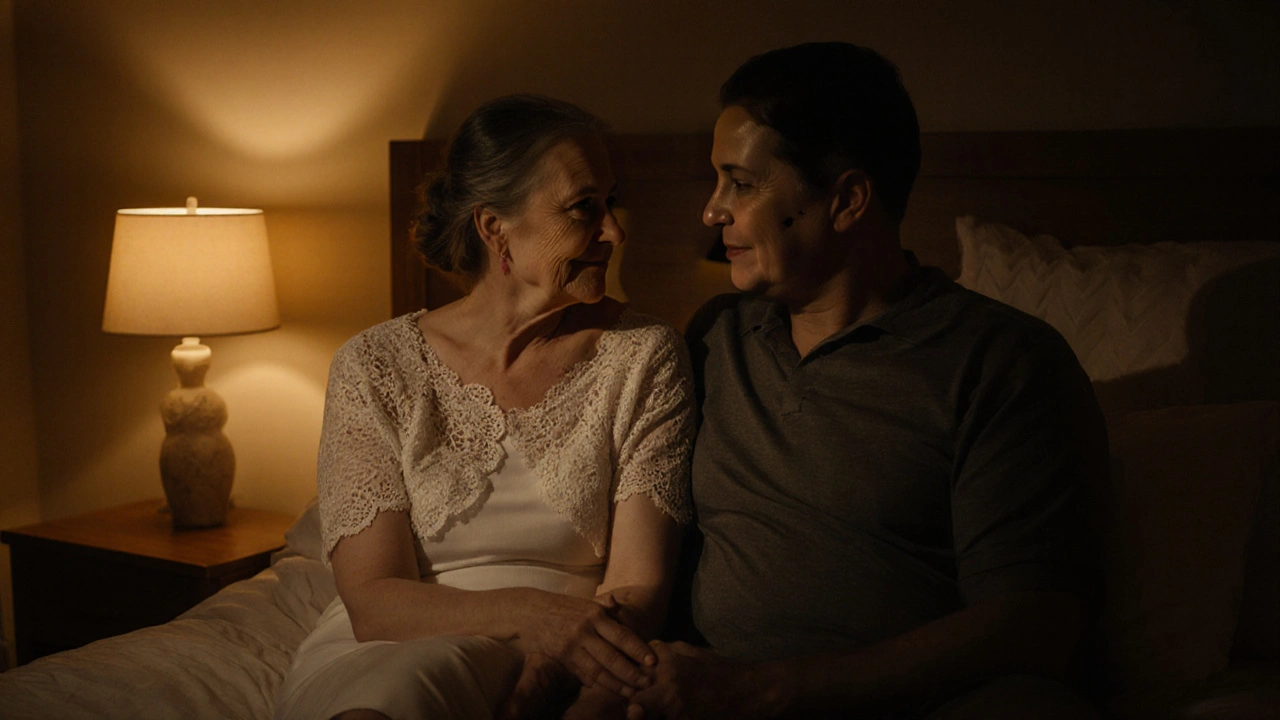Intimacy after breast cancer is a multifaceted aspect of survivorship that blends physical, emotional, and relational dimensions, shaped by treatment side‑effects, body image, and evolving partner dynamics. For many couples, the diagnosis turns a once‑simple part of life into a source of anxiety, confusion, or grief. This guide walks you through the most common challenges, proven coping tools, and concrete steps to rebuild a satisfying connection.
TL;DR - Quick Takeaways
- Open, honest communication beats assumptions - schedule a weekly check‑in.
- Address body image early; gentle self‑touch can restore confidence.
- Physical intimacy may need new positions or lubricants, especially during hormone therapy.
- Emotional intimacy thrives on shared activities and non‑sexual affection.
- Professional help-counselors, physiotherapists, and support groups-boosts recovery for both partners.
Understanding the Core Entities
Before diving into strategies, let’s define the key players that shape intimacy after a breast cancer diagnosis.
- Breast cancer is a malignant growth of breast tissue cells that affects roughly 1 in 8 women in NewZealand (Cancer Council NewZealand, 2024).
- Sexual health is a state of physical, emotional, mental, and social well‑being related to sexuality, not merely the absence of disease.
- Physical intimacy refers to bodily contact that can include sexual intercourse, kissing, or caressing.
- Emotional intimacy is a deep sense of trust, vulnerability, and shared feeling between partners.
- Body image describes how a person perceives and feels about their own body, often shaken after surgery or scarring.
- Partner communication is the process of exchanging thoughts, concerns, and desires with a significant other.
- Therapeutic counseling includes psychological support from trained professionals, such as sex therapists or survivorship counselors.
- Hormone therapy is a treatment that blocks estrogen to prevent cancer recurrence, often causing vaginal dryness and reduced libido.
- Lymphedema is fluid buildup in the arm or chest after lymph node removal, which can make certain positions uncomfortable.
- Reconstruction surgery is a procedure to restore breast shape post‑mastectomy, influencing sensation and self‑esteem.
Common Challenges and Why They Happen
Each entity brings its own set of hurdles. Recognising the root cause helps target the right solution.
- Physical side‑effects. Surgery, radiation, and hormone therapy can cause pain, decreased libido, or sensory loss. A 2023 study by the University of Otago reported that 68% of women on tamoxifen experienced vaginal dryness.
- Body image shifts. Scars, asymmetry, or loss of breast tissue often trigger self‑consciousness. In a focus group of 50 survivors, 74% said they avoided skin‑to‑skin contact for at least three months.
- Emotional fatigue. The mental toll of diagnosis, treatment appointments, and fear of recurrence can drain the desire for closeness.
- Partner uncertainty. Many partners worry about saying the wrong thing or unintentionally causing pain, leading to silence and distance.
- Lymphedema discomfort. Swelling and heaviness in the arm limit certain embraces or positions.

Step‑by‑Step Roadmap to Reclaim Intimacy
- Start with a communication ritual. Set aside a 15‑minute “relationship check‑in” once a week. Use "I" statements: "I felt anxious when we skipped hugging yesterday".
- Map the body‑map. Each partner gently explores the other's comfortable zones using non‑sexual touch. This restores confidence and identifies new erogenous zones.
- Address medical side‑effects. Talk to your oncologist about lubricants, water‑based or silicone, and consider vaginal moisturizers if on hormone therapy. Physical therapists can teach lymphedema‑friendly stretches.
- Re‑define sexual scripts. Experiment with side‑lying, seated, or water‑based positions that reduce pressure on the chest and arm.
- Boost emotional intimacy. Share a hobby, schedule a "no‑screen" dinner, or write short love notes. Emotional closeness often reignites physical desire.
- Seek professional support. Couples counseling with a certified sex therapist, or joining a survivorship support group, provides safe space for honest dialogue.
- Celebrate small wins. A kiss, a laugh, or a night of cuddling counts. Track progress in a journal to see growth over weeks.
Comparison of Physical vs. Emotional Intimacy
| Aspect | Physical intimacy | Emotional intimacy |
|---|---|---|
| Primary focus | Body contact, sexual activity | Trust, shared feelings |
| Common challenges | Pain, dryness, lymphedema | Fear of vulnerability, anxiety |
| Typical interventions | Lubricants, new positions, physiotherapy | Couples counseling, shared hobbies |
| Timeline for improvement | Weeks to months, depending on healing | Often quicker; daily conversation can shift perception |
Related Concepts and Next Steps
While this article focuses on intimacy, a broader survivorship journey includes other health‑related topics:
- Nutrition and fatigue management. Proper diet can boost energy for both daily life and intimacy.
- Fertility considerations. Some treatments affect reproductive plans, which may influence relationship dynamics.
- Psychological resilience. Mindfulness and CBT have proven effective for reducing cancer‑related anxiety.
Readers interested in deeper dives should explore articles on "Post‑mastectomy body image" and "Managing lymphedema for couples" next.

FAQs
Can breast reconstruction affect my sexual desire?
Reconstruction can change sensation, sometimes reducing nerve feedback, which may lower desire initially. However, most women report that desire returns once they adjust to their new body image and discuss feelings openly with their partner.
Is it normal to feel embarrassment about my scar during sex?
Absolutely. A scar is a visible reminder of treatment, and many survivors experience self‑consciousness. Gentle gradual exposure-starting with light touch over the scar-helps desensitize the emotional response.
What lubricants are safe during hormone therapy?
Water‑based lubricants are universally safe and won’t interfere with medication. Silicone‑based options last longer but may affect latex condoms; choose according to your contraception method.
How can my partner support me without being overbearing?
Ask for specific ways to help-whether it’s a massage, setting up a calming environment, or simply listening. Clear requests prevent assumptions and let the partner act in a way that feels supportive.
Should we see a therapist together or separately?
Both approaches have value. Joint sessions address shared concerns, while individual therapy lets each person process personal emotions. Many couples find a blend works best.
Is it okay to have a sex‑free period while recovering?
Yes. Healing takes priority, and pressure to resume sexual activity can increase stress. Communicate the need for a break; intimacy can still thrive through cuddling, eye‑contact, and verbal affection.
What community resources are available in NewZealand?
The Cancer Council NZ runs survivor support groups in most cities, including Dunedin. Additionally, the Breast Cancer Care NZ offers counseling, and local physiotherapy clinics often have lymphedema specialists.

Rebuilding intimacy after a breast cancer diagnosis really starts with establishing a safe communication ritual; you might set a weekly 15‑minute “relationship check‑in” where each partner says exactly what they felt, what they need, and what they fear without interruption, and this simple practice lays the groundwork for trust. First, acknowledge that the body has changed, and that change can feel like a betrayal, so normalizing those feelings helps both partners stay on the same page. Next, explore a gentle body‑map together: use non‑sexual touch to discover comfortable zones and new erogenous areas, which can be especially liberating after surgery or radiation. Remember to involve your oncologist early by asking about lubricants-water‑based options are safe and won’t interfere with hormone therapy-and consider vaginal moisturizers if dryness is an issue. Physical therapists can also teach lymphedema‑friendly stretches, which reduce swelling and open up more comfortable positions for intimacy. When experimenting with new sexual scripts, think side‑lying or seated positions that keep pressure off the chest and arm, and don’t be afraid to use pillows for support. Emotional intimacy grows when you share non‑sexual activities: cooking together, taking walks, or even writing short love notes can rebuild the emotional bond that fuels desire. Celebrate the small victories- a kiss, a hug, a night of cuddling-by tracking them in a journal so you can see progress over weeks rather than focusing on setbacks. If anxiety or grief feels overwhelming, seek a certified sex therapist or join a survivorship support group; these resources provide a judgment‑free space to discuss concerns openly. Finally, remember that recovery is not linear; some weeks will feel smoother than others, and that’s perfectly okay. By staying patient, honest, and proactive, couples can navigate this challenging terrain and emerge with a deeper, more resilient connection.
One might argue that intimacy, in its essence, is a dialogue between bodies and souls, and when illness intrudes, the conversation must be re‑examined; thus, the ritual described is not merely pragmatic but philosophically profound, echoing the ancient notion that shared vulnerability restores the self. In this light, the weekly check‑in becomes a modern agora, a place where truth is spoken without pretense. Moreover, the act of mapping the body can be seen as a cartographic meditation, charting new territories of pleasure that were previously uncharted due to the disease.
Wow!! This is such a helpful guide!! I love the idea of a weekly check‑in – it really takes the guesswork out of what each partner might be feeling!! Keep sharing these kinds of tips!!
Dear colleague, I appreciate your enthusiasm; it is indeed commendable to adopt structured communication. May I suggest, with due respect, that one also incorporates moments of reflective silence to allow subconscious processing? 😊
When you talk about lubricants remember water based ones are safe it won’t mess with hormone meds also silicone lasts longer but watch out for latex condoms another tip use pillows for support during side lying positions it distributes weight evenly and reduces discomfort also schedule a physio session for lymphedema stretches they’re crucial for arm mobility and overall comfort finally write down each small win in a journal it helps you see progress over time and stay motivated
Great points! I’d add that couples could set a reminder on their phone for the weekly check‑in-makes it feel official. Also, experimenting with a warm shower together can ease muscle tension before exploring new positions.
It is worth noting that the pharmaceutical industry often downplays the sexual side‑effects of hormone therapy to protect profit margins; patients are frequently left uninformed about the necessity of seeking independent specialists. Moreover, the very protocols that dictate postoperative care can sometimes be influenced by non‑clinical agendas, which is why a critical eye toward your medical team is essential.
Honestly, I think focusing on conspiracy theories distracts from the very real, personal work couples need to do. While it's good to be informed, obsessing over hidden agendas won't replace a gentle touch or honest conversation.
Thank you for the comprehensive overview! 🌟 It’s especially useful to have specific suggestions like using water‑based lubricants and scheduling physiotherapy. I’ll definitely share this with my support group.
I agree wholeheartedly; adding concrete actions like setting reminders and trying new positions can genuinely improve intimacy. It’s also vital to check in on emotional needs regularly, not just physical ones.
Great, now I can finally stop pretending everything’s fine.
Yeah, because ignoring it totally works better, right?
so i was reading this whole thing and i think its cool but also i dunno if i can actually do all the stuff like weekly check ins seems a bit much if you ask me maybe just a quick text now and then i guess? lol
While some may view a brief text as sufficient, the depth of connection required after such a transformative experience cannot be reduced to a fleeting notification; the drama of survivorship demands a ritual, a ceremony of shared vulnerability that transcends the banalities of modern communication, for only through deliberate, sustained dialogue can the phoenix of intimacy truly rise from the ashes of trauma.
The guide covers a lot but it could use more emphasis on mental health and less on just physical tips I think integrating CBT techniques would be beneficial especially for anxiety related to body image
Honestly the entire medical establishment is complicit in ignoring the real psychological trauma caused by these treatments!!! Patients are left to fend for themselves!!! This guide barely scratches the surface!!!